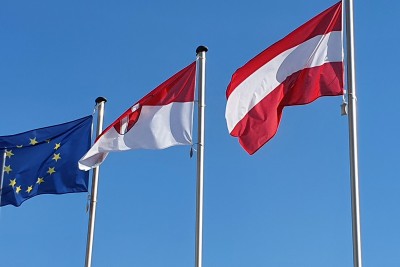EU Strengthens Multilateral Diplomacy in Vienna Amid Global Challenges
In a move to bolster multilateral diplomacy and cooperation, the Ambassadors to the Political and Security Committee (PSC) of the Council of the European Union embarked on a significant visit to Vienna. This visit underscores the European Union's aspirations to strengthen its role in the global multilateral and security order, particularly at a time when the world is grappling with multiple crises.
 The European Union's Political and Security Committee Ambassadors, comprising 27 EU Member State Ambassadors, visited Vienna to understand multilateral diplomacy and the "Vienna Spirit." / Picture: © Vindobona.org
The European Union's Political and Security Committee Ambassadors, comprising 27 EU Member State Ambassadors, visited Vienna to understand multilateral diplomacy and the "Vienna Spirit." / Picture: © Vindobona.org
The delegation, comprising Ambassadors from the 27 EU Member States, traditionally convenes in Brussels but chose Vienna for this pivotal meeting to engage directly with key international organizations, including the United Nations (UN) and the Organization for Security and Cooperation in Europe (OSCE). The focus was on understanding the current state of multilateral diplomacy in the city and exploring the essence of the "Vienna Spirit" in today's geopolitical context.
Common security challenges require inter-institutional cooperation - today during their visit to Vienna, PSC Ambassadors met with HoMs to the @UN_Vienna and @OSCE, highlighting that #MultilateralismMatters @euunvie @EUOSCE @MinisterIanBorg @MFETMalta https://t.co/eboLK0U6Sm
— Malta in Austria (@MaltaEmbVienna) February 9, 2024
Ambassador Carl Hallergård, the Head of the EU Delegation in Vienna, initiated the discussions at the historic Hofburg, home to the OSCE, emphasizing the importance of consensus and cooperation among EU members. Ambassador Delphine Pronk, Chair of the PSC, echoed this sentiment, advocating for strong collaboration to address the myriad threats and instabilities facing the EU. The Ambassadors agreed that effective multilateralism, a cornerstone of EU foreign policy, is crucial in navigating the current global challenges.
The visit also included meetings with top officials from the OSCE, the Federal Ministry for European and International Affairs of Austria, the International Atomic Energy Agency (IAEA), and the United Nations Office on Drugs and Crime (UNODC). These discussions covered a wide range of topics, from the OSCE's role in European security and its activities across all security dimensions to the critical work of the IAEA in ensuring nuclear safety in Ukraine and addressing the nuclear programs of Iran and North Korea. The Ambassadors also explored opportunities to enhance EU-UN cooperation in combating corruption, human rights violations, and various forms of trafficking.
Interesting and timely meeting of EU Ambassadors and PSC Ambassadors at the Hofburg, discussing the challenging context of multilateral work in the Vienna-based organisations. pic.twitter.com/a8mfVh1KfQ
— Belgium in Vienna (@BelgiuminVienna) February 9, 2024
The PSC's visit to Vienna was not only a testament to the EU's political weight in the multilateral arena but also a call to action for even greater engagement and support, both politically and financially, from the EU and its Member States. It highlighted the EU's unique position and convening power on key global issues, extending its influence beyond like-minded states and reinforcing the importance of diplomacy and multilateralism in addressing today's global challenges.
The PSC plays a crucial role in providing strategic recommendations and monitoring international developments relevant to the EU's Common Foreign and Security Policy. It drafts opinions for the Foreign Affairs Council, which is a key configuration of the Council of the European Union, and its decisions typically require unanimous agreement among member states' representatives. The committee's role in command and control of missions involves coordination and support at various strategic and operational levels, ensuring that the EU's foreign policy actions are coherent and effective.
This visit to Vienna demonstrated the EU's significant political weight in the international arena but also called for even greater engagement and support, both politically and financially, from the EU and its Member States. It highlighted the EU's unique position to influence key global issues and reinforced the importance of diplomacy and multilateralism in addressing today's complex global challenges.



